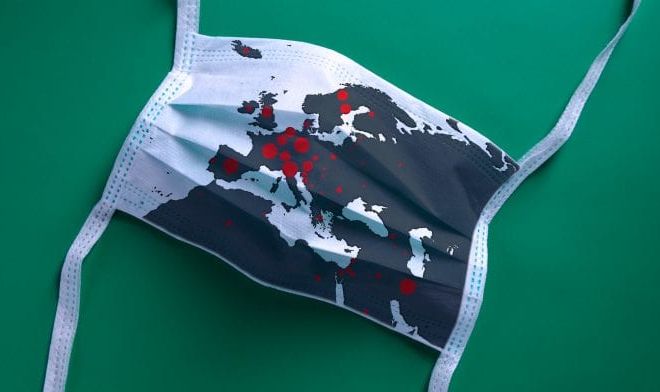Per-Åke Westerlund is a member of Rättvisepartiet Socialisterna (ISA in Sweden).
This article deals with the second wave in Europe but in Canada, too, government failings have pushed new COVID cases to the highest level ever.
Germany is experiencing a “very serious rise,” Czechia faces an “enormous surge” while Spain needs “drastic measures” while countries such as Ireland, Croatia, Poland and Russia report record daily cases, far exceeding those experienced in the first wave. Yet health systems are still not prepared.
The COVID pandemic is far from over. On 17 October, 432,000 new cases of infection were registered globally, double the daily numbers in early July, which in turn were double the numbers in April and May. The highest number of daily recorded deaths was 9,796 on 30 April, but after a drop between June and August, it was 8,680 on 10 October.
There is now a definite second wave in Europe, with a sharp rise of infections in most countries, both those previously affected hit hard by the pandemic and those who saw fewer infections and deaths in the Spring.
Governments everywhere have failed to prevent this second wave. The health sector and the conditions for health workers have not been drastically improved.
Rapid testing and contact tracing has not been sufficiently implemented. Advice on protection equipment has been vague and access limited. Workers are advised to go to work but are blamed if they use public transport. Compensation for lost wages and jobs has been less than what is needed and has already been reduced in many countries.
The priority for governments has been to protect the profits of banks and big business. That has led Prime Ministers and Health Ministers to ignore advice from their own health experts, following the pattern of Trump and Bolsonaro. Avoiding taking measures, they have also aimed to get support from an increasing public unease and desperation caused by lockdowns, isolation and fear over wages and jobs.
However, postponing measures has not helped, and in recent weeks most European governments have been forced to act. After two weeks of debate, the Irish government decided to go back to a six week almost-total lockdown, this time excluding schools. At that stage, Ireland had 242 new cases per 100,000 inhabitants. Belgium, with three times more cases per capita, ordered the closure of bars and pubs for four weeks. Other countries recorded their highest number of cases per day – for example Germany, Poland and the Czech Republic, with the latter having the highest number per capita in Europe. Also in Italy, which was hit so hard in the spring, there are now almost double as many infected per day than was recorded in April and May.
Fewer, so far, have died in the second wave than in the first. That has been explained by those infected being younger and improved treatments. However, the wider effects on people’s lives and the economy, causing fear for the future, are as hard hitting as during the first wave.
Debates and conflicts
During the first wave, most political parties supported measures taken by governments. This element of political “truce” at the top also reflected pressure and fear among the broad population, with workers in many cases taking the initiative to implement safety measures and self quarantine, including through strikes and workplace action which forced bosses to act in many countries.
This time is different, with more criticism and debates. In Britain, the number of cases increased from 400–1,700 per day in the summer to more than 20,000 in October. In the last week only, 1,500 new patients have needed intensive care. This is in a situation where health workers in the UK as elsewhere are already exhausted after the extreme pressure of the pandemic.
With the capitalist economy as its top priority, the government in London decided that measures should have three levels, from a partial lock down (level 3), already implemented in Liverpool, Manchester and Lancashire, to softer measures such as earlier closing hours for bars, etc in other regions. The Johnson government’s demand for level 3 restrictions led to a confrontation with Manchester, whose mayor, the Labour right-winger Andy Burnham, challenged the government demanding more money for the city and its population as a response to being placed level 3. This forced Boris Johnson to offer an insufficient £60 million to the city before unilaterally implementing level 3 in Manchester. Protests demanding fair compensation to workers impacted by this imposition are expected in Manchester this weekend.
The centrifugal forces at play in the UK are underlined by the government actually only being in charge of England when it comes to COVID restrictions, not Wales (which has already taken much stricter measures), Scotland and Northern Ireland.
In the Spanish state, the local right-wing government in Madrid won in court against the state government’s decision to impose a partial lockdown there. Also in France, local authorities have challenged central decisions. In Germany, some companies won court cases against the government over restrictions.
Street protests against COVID restrictions and rules to wear masks have taken place in Italy, Czech Republic and Germany, where they gathered thousands. Organisers were a mix of the extreme right, populists and supporters of conspiracy theories, though many demonstrating probably did not belong to any of them.
The traditional and former left parties, alongside trade union leaderships, with their passivity and support for right-wing policies, have left space for other forces. The appearance of right-wing populism is a sign of the weakness of working class organisations.
Recession and job losses
The second wave in Europe is causing big worries over the economy. The European Central Bank expected growth of over 3% in the final quarter this year, but many economists now believe the year will end with a new recession.
Already, debts have increased drastically, both public debts and companies bordering on bankruptcy. In Ireland alone, the government expects a loss of more than 100,000 jobs as a result of the new lockdown.
Conflicts at the top in society, between states representing their national capitalist classes and in domestic politics, are in themselves signs of the weakness of the system. The neoliberal model in power for over three decades has completely failed – regarding health, the economy and the climate.
The mood of revolts from below expressed in many countries last year and also in 2020 will get new impetus from the second wave of COVID and especially when the wave recedes. Health workers have already been at the forefront, with strikes in Catalonia and the big protest demonstration in Belgium. Teachers have also organised against the lack of safety in the schools.
The system is guilty
The new lockdown will sharpen questions of democracy – why should people meet up at workplaces, but not with family and friends? Why are new laws used or prepared to block gathering and protests, while shopping malls can stay open? Safety issues and rules must be placed under democratic control, not negotiated in secret meetings of politicians. This includes the right to rapid tests and to stay home, but also the right to protest and hold COVID-secure demonstrations.
The pandemic will not disappear, and a vaccine could take another year to develop and even longer to distribute in Europe. Massive increases in resources to healthcare and democratic distribution of care, medicine and a vaccine are needed.
Economic issues will of course also be at the forefront – workers fighting to pay bills and rent, while stock markets rise and shareholders get record dividends. Full economic compensation and no layoffs, are key demands.
Socialists, left wing organisations and trade unions must fight on all issues connected to the pandemic and the crisis. That includes increases in mental health problems and other health effects, increased violence against women during lockdown, the threat from right-wing nationalism and racism, continued climate crisis and more.
The fighting mood shown in many countries will come together with broader layers criticising a system unable to protect us from the pandemic, instead being a big reason for the pandemic in the first place. No crisis ever before has been as international as this one, in relation to health, socially or economically. Latin America is hit worse than Europe, the US has more deaths and India has more cases. The need for international solutions is obvious, while governments are turning more nationalistic, including with new arms races. There is no capitalist way out, the whole capitalist system has to be abolished and replaced with democratic socialism – for people, health and the planet.




